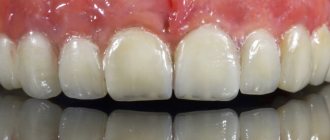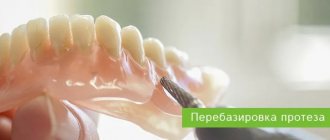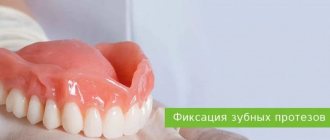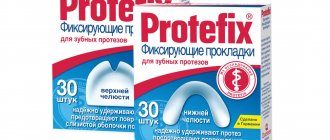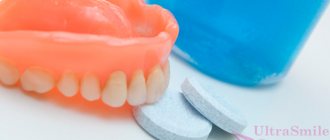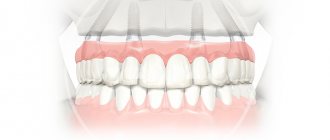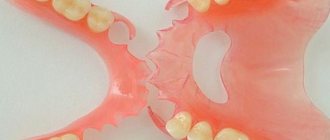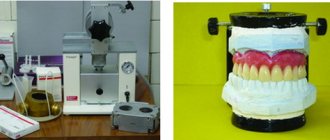In many cases, a denture is a solution to the problem of missing several teeth in a row. At the same time, the choice in prosthetic instruments is so great that patients can afford orthodontic devices of a wide variety of designs, different materials and price categories. As you know, all prosthetic devices are divided into removable and non-removable. The latter are distinguished by a more rigid permanent fixation, but removable dentures become optimal for many, since they allow the dental structure to be removed if necessary.
Even if the removable denture was made from expensive materials by the best specialists (as in the LeaderStom clinic), then even in this case, there may be voids in some places between the prosthetic device and the gum tissue, and abrasions or areas of increased pressure on the gum in others. This fact is not considered a defect or defect of dentists: the fact is that such minimal defects are eliminated themselves during the period of adaptation to the prosthesis, or by using special fixing agents and materials.
Review of the best creams for fixing dentures: features of composition and application
Article navigation
- Why do we need fixing agents for dentures?
- The main components of creams that provide fixation
- Rating of the best creams
- 1. “Fittident” (Austria)
- 2. "Rox" (Switzerland)
- 3. "President" (Italy)
- 4. "Protefix" (Germany)
- 5. “Lakalut” (Germany)
- 6. Corega (Ireland)
- How to choose the most suitable product
- How to use the composition correctly
- Side effects of using the compounds
Question for a specialist
Most removable dental structures are attached to the soft tissue of the gums and palate. To prevent their loss, ensure reliable fixation and full performance of their intended functions, use denture cream. The product is suitable for wearing acrylic, nylon and silicone products. About which cream for dentures is better, the features of choice and the nuances of use later in the article.
Why do we need fixing agents for dentures?
Cream for dentures provides not only reliable fastening of the product in the oral cavity. At the same time it performs the following functions:
- accelerates adaptation to the design, since it eliminates chafing of the mucous membrane,
- prevents the accumulation of food masses between the product and the gums, because adheres to the mucous membrane more tightly,
- provides protection of the mucous membrane from the mechanical impact of the prosthetic structure - you will experience less pain and discomfort, both at rest and when eating,
- prevents gum inflammation (some products contain anti-inflammatory components),
- Gives freshness to your breath thanks to the additives included in the composition (not all).
Don't know what type of prosthetics to choose?
We will help in the selection, advise where to read more information and compare types of prosthetics.
Consultation with an orthopedic doctor in Moscow clinics is free! Call now or request a call
Working hours: from 9:00 to 21:00 - seven days a week
Fixing strips
A remedy such as fixing strips is more often used for various malocclusion pathologies.
In addition, strips are useful if it is difficult to get used to dentures. They are made from a special material that ensures good fixation of removable structures. Additionally, the strips also protect the gums from damage. This product is very easy to use. Usually, for good fixation, the strip is immersed in warm water for a few seconds. Then it is applied to the prosthesis and inserted into the mouth together with it.
The main components of creams that provide fixation
Almost all creams for fixing removable dentures have a similar composition, differing only in some components. For example, substances of natural origin (plant and/or animal) may be added to them. Many manufacturers add aromatic ingredients to improve the taste of the product and ensure freshness in the mouth.
It is important to know! For people prone to allergic reactions, it is better to purchase creams for attaching dentures that have a neutral, hypoallergenic composition. Some manufacturers produce different series of products that allow you to choose the best option. Pay attention to flavoring additives - most often it is mint, eucalyptus, less often - citrus fruits and even chocolate.
Many creams that provide reliable fixation of removable dental structures contain zinc. Its presence allows you to achieve the most durable adhesion of surfaces. And at the same time, it has an excellent wound-healing effect - useful if new teeth are chafed. Many people are afraid to use products with zinc. However, its negative effect on the body occurs mainly in case of ingestion. Therefore, it is important to use this drug correctly: apply only once a day and in small quantities.
Rating of the best creams
To choose the best cream for dentures, you will need to not just read user reviews online, but carefully study the composition of the product and consult with a specialist. In most cases, you will be able to give preference to a particular drug after using several options, that is, after testing it through personal experience. This is due to the individual characteristics of the body and the different properties of the materials of orthopedic structures. The rating of creams presented below is based on the opinion of both doctors and people who use them.
"Fittident" (Austria)
Fittydent is the best denture cream according to most users. Its only drawback is its high cost - about 500 rubles per tube. It has gained great popularity due to its harmless composition (no zinc or dyes), high resistance to liquids, and economical consumption. “Fittident” reliably fixes the removable structure in the mouth for 12 hours – this is more than enough for a day of use.
"Rox" (Switzerland)
ROCS (“Rox”) is the best denture cream in terms of cost and quality. It contains special substances that prevent and eliminate the inflammatory process, as well as compounds that maintain the normal balance of beneficial microorganisms in the oral cavity. Another advantage is resistance to high temperatures of consumed foods and liquids. In addition, the product has a low price (on average 250 rubles per tube), ensures stable retention of the prosthesis for 12 hours, and gives freshness to the breath thanks to the mint component. Rox contains no zinc or dyes.
“I was forced to install a removable denture on the upper jaw, I spent a long time looking for some kind of glue, because it was constantly falling out. I tried everything... I settled on Rox. Now I feel confident and comfortable in any situation.” Olga Sergeevna, 58 years old
Service life of removable dentures
If you follow the rules and provide regular care for your removable dentures, the design will last you a long time. The minimum service life of prostheses is three years. The production of new prostheses after a certain period of time is extremely necessary - wearing outdated structures causes bone tissue atrophy and “sagging” of the lower part of the face.
When wearing removable dentures, it is important to visit a dentist at least twice a year. The doctor relines the prosthesis - restoring a tight fit of the prosthesis to the jaw. The doctor also examines the general condition of the oral cavity, which allows timely detection and treatment of inflammatory processes.
If you feel severe discomfort while wearing removable dentures, dry mouth, pain, then contact your dentist as soon as possible - he will help identify the causes of symptoms and carry out the necessary restorative procedures.
"President" (Italy)
Fixing cream for dentures PresiDENT (“President”) creates a dense layer under the structure that prevents particles of food mass from entering. The manufacturer assures that the effect of the product lasts throughout the day and can reach 36 hours. The absence of allergies, economical consumption, low cost (within 250 rubles) and high quality of the composition allow it to occupy a high position in the TOP of means for retaining removable structures. However, many people are faced with the fact that they cannot buy this product in all pharmacy chains.
"Protefix" (Germany)
Among the positive properties of the popular cream for fixing dentures, Protefix (“Protefix”), we can note: economical consumption, excellent adhesion, dense structure that limits the penetration of food. The manufacturer has released three types of “Protefix”: without coloring and aromatic components (suitable for allergy sufferers), with mint, and with aloe. The product deservedly receives positive reviews from users due to its affordable price (about 200 rubles) and the possibility of use for increased sensitivity of the mucous membrane. Among the disadvantages, users note the inconvenience of the dispenser and the weakening of the fixation under the influence of hot food.
Indications for the use of fixing materials
Many people ask whether it is always necessary to use additional means to fix dentures? Most often, such means are used:
- for the reliability of using the prosthesis (to facilitate biting and chewing food, to eliminate the fear of losing the prosthesis when speaking);
- people whose profession involves increased demands on appearance or voice (teachers, musicians, speakers);
- with dry mouth due to diseases (stroke, etc.) or taking certain medications, in elderly patients.
"Lakalut" (Germany)
Cream for removable dentures Lacalut (“Lakalyut”) is included in the rating of leaders due to the high degree of fixation and speed of setting with surfaces. You can eat food within five minutes after installing the structure in the oral cavity, and the structure will remain in place for a whole day. The composition of Lakalut contains, in addition to fixing components, anti-inflammatory compounds and substances that prevent unpleasant odors. Users consider the high cost to be a disadvantage of the product - about 400 rubles per tube.
Glue
Denture adhesive acts as a soft cushion to cushion movement between the jaw and the structure during chewing. It is used for fastening both removable and permanent dentures (fixing a crown, temporarily strengthening a tooth or a broken bridge).
Adhesives are usually water-based.
The disadvantage of this product is associated with the gradual dissolution of the components and loss of effectiveness of the composition.
Excess glue can irritate your gums. The most commonly used glue is from Protefix, Corega, and Fittident.
Corega (Ireland)
Cream for dentures Corega (“Corega”), along with positive reviews, has quite a lot of negative ones. Among the advantages are an affordable price (about 250 rubles), economical consumption, and the possibility of use for sensitive gums. Its use does not require preliminary drying of the structure. The negative aspects include the rapid dissolution of the product under the influence of water, which leads to a short period of operation - only 3-4 hours. The same property provokes the entry of the composition into the digestive tract during food intake.
How to choose the most suitable product
What should you pay attention to when choosing the best cream for fixing dentures? The main criteria are the following.
- fixing properties: if you rarely use dentures (for example, only to go out on a visit or to the store), then long-term fixation may be unnecessary. In this case, you can buy Corega. If the product is needed for a long time (12-hour working day), you should take a closer look at a stronger version of the composition,
- resistance to water: some compositions lose their fixing qualities under the influence of saliva or frequent consumption of drinks or liquid food. This is important to consider - reviews and personal observations will help here,
- features of the composition (the presence of aromatic and flavoring additives, the presence of anti-inflammatory components, zinc and others: paying attention to this parameter is important if you are prone to allergies or intolerance to any substances. It should be taken into account that some flavorings can change the taste of food,
- resistance to mechanical stress: this point is related to the load on the removable structure during chewing food, and depends on both the frequency of intake and the nature of the products consumed, the type of heat treatment,
- economical use: here it is necessary to consider not only the material capabilities of the user and the cost of the drug, but also the frequency of use of the product, its required optimal amount. So, if you rarely use the composition, you can afford to buy a high-quality cream and “turn a blind eye” to the high price.
REPROSTHETICS WITH ACRYLIC PROSTHETICS - RUB 150,000. instead of 180,000 rub. until January 15, 2022!
Re-prosthetics with an acrylic bridge on a metal frame (all included) up to 12 units.
Call now or request a call
On a note! Unstable fixation or other deficiencies do not always mean that the fixative cream for dentures is “bad.” If the product is not suitable, possible reasons may be: design features (material, shape, installation nuances) and the maxillofacial apparatus, as well as the volume of saliva secreted.
Recommendations for getting used to a prosthetic device
Dentist specialists from the LeaderStom network of clinics believe that the process of adaptation to a prosthetic device takes on average up to 2 months. The most difficult of them are the first two weeks. During this period, symptoms such as:
- difficulty speaking;
- difficulties with chewing and swallowing, leading to a gag reflex;
- sensation of sore gums or general discomfort from fixing the prosthesis;
- increased salivation.
The advantage of a removable denture is that in case of severe discomfort, the device can always be removed for a short time and rest. At first, it is recommended to wear the prosthetic device not during meals, but in the intervals between meals. The next stage of adaptation will be putting on the prosthesis at night. When the body has already gotten a little used to it, you can move on to fixative drugs.
With increased salivation, sucking candies are very helpful because they stimulate the swallowing reflex. It is recommended to drink plenty of water in small sips to teach the body to swallow with the presence of a prosthetic device.
During the period of adaptation to the prosthesis, you should adhere to a gentle diet and exclude solid foods. Do not worry if the installation of a removable denture has a negative impact on the taste of food. This is a quite common symptom that goes away on its own after two weeks of using the prosthesis and does not depend in any way on the fixation agent.
Difficulties in speaking while wearing a denture are also temporary, but most patients will need to work on it a little. The best way is to read aloud. If you have grandchildren, then bedtime stories will not only be useful for them, but also effective practice for your pronunciation.
In rare cases, wearing a prosthesis causes so-called individual intolerance, when psychological discomfort exceeds physical discomfort. However, such a diagnosis can only be made after 2-3 weeks, when at the physiological level the adaptation of the prosthetic device has been successful, but the patient still continues to experience severe discomfort. In such a situation, you can simply postpone wearing the prosthesis and wait for a more favorable moment. There are many cases where the prosthesis “took root” two to three months after its first installation and fixation.
How to use the composition correctly
Fixation cream must be used according to the instructions. The general rules are the following:
- the product is applied to the prosthesis from the inside, only on the lines intended for this purpose and in a small amount (if there is a lot of it, the fixation strength weakens). The recommended volume is usually indicated in the instructions, and the most optimal for a particular person is established experimentally,
- strong creams for dentures containing zinc should not be applied more than once a day - the risk of neurological disorders increases,
- the structure must be clean: before applying the fixing composition, it should be washed with warm water (if necessary, ordinary soap can be used) and wiped dry with a lint-free cloth,
- After removing the removable denture, the fixing cream must be removed: to clean the structure from residual composition, use a toothbrush with extra soft bristles and toothpaste intended for small children (due to their low abrasiveness, such pastes do not damage the surface of the product).
On a note! If, when removing the structure before going to bed, it turns out that it is securely fastened, it is permissible to leave it until the morning. Next time, the amount of composition applied should be reduced.
Features of prosthesis care
The presence of a prosthesis-fixing material does not relieve the patient from the procedure of daily cleaning of the dental structure. The effect of adhesive materials is calculated from several hours to one day.
In the morning and evening, the denture should be thoroughly rinsed and cleaned with a special soft brush. Experts recommend not using toothpastes with abrasives when brushing. Even if your denture is made of high-quality ceramic, harsh cleaning particles can damage it with daily use. Remains of fixing cream or powder can be easily removed using regular children's toothpaste. For those who prefer the best protection of their prosthesis from germs and dirt, there are specially designed tablets. They are dissolved in a glass of water where the prosthetic device is placed and left overnight for a cleansing effect.
You don’t have to endure the discomfort of a prosthetic device alone—contact your dentist at the slightest sign of chafing or pain. The prosthetic device itself can be subject to correction, its functional qualities can be adapted individually to the patient. And then the period of adjustment will become easy and pleasant for you, and fixing drugs will help you adapt even faster to your new life with new teeth.
Side effects of using the compounds
Even the best denture creams can cause side effects. Most often, users indicate the following body reactions: swelling of the gums as a result of pressure from the structure or the development of an allergic reaction, headaches, taste disturbance, increased salivation, nausea, vomiting, discomfort in the digestive tract.
Various factors underlie such manifestations. Perhaps the drug is not suitable for a person due to the characteristics of its composition, or the buyer is prone to allergies. Another reason could be a violation of the recommendations for the use of a fixing agent specified in the instructions. In addition, there is a possibility of purchasing a counterfeit product. Therefore, when studying the rating of denture creams, you should not forget about other nuances of use.
Author: Chorny S.V. (Thank you for your help in writing the article and the information provided)
Causes of tooth loss
Most often, removable orthodontic structures are installed when several teeth are lost. Sometimes congenital malformations lead to missing teeth. But more often the following reasons lead to their loss:
- consequences of dental disease (caries, periodontitis, etc.);
- jaw injuries;
- taking narcotic substances (pervitin, etc.)
Loss of teeth leads to such serious problems as speech impairment, deterioration in chewing food, and excessive stress on the remaining teeth with consequences such as their loosening and loss.
Often, the absence of teeth leads to psychological problems that prevent a person from realizing himself in many areas.
But thanks to the achievements of modern dentistry, missing teeth are now very effectively replaced with artificial dentures. Modern dental structures are ideally similar in appearance and functional properties to natural teeth; they are durable and comfortable.

